Gender+
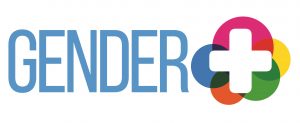
Project duration: 2018 – 2020 Recent developments in gender issues – from an increased awareness of trans rights to female equality and ‘lad’ culture – have brought a range of gender identities into the mainstream. At the same time Generation Z has a far more fluid approach to gender than has previously been seen. The problem for VET schools is that they have found it difficult to keep up to date with these rapid developments. As a result, their provision, facilities and policies are not always set up to offer a welcoming environment for the range of gender identities that may now look to engage with their services. This is true of potential new staff as well as students – with a shift in the whole approach to VET provision – from course design and promotion, to HR policies and recruitment needed. It is certainly true that there are already some excellent examples around gender diversity training found across Europe. However, the most common approach within VET to tackling gender identity is to take a bottom up approach, which sees training and resources being focussed on individual groups or issues (e.g. just women or just trans issues etc.). The problem for VET professionals is that their provisions need to address the nuanced needs and demands of all of these groups, something which this more targeted training does not prepare them for. Therefore, the project looks to address this imbalance by providing tools which allow VET practitioners to develop a top-down view. In practice this will mean helping them to develop institutional frameworks and policy which enables them to highlight deficiencies and so focus on areas where the training already available on gender issues can have a real impact. Ultimately this will allow VET institutions to create inclusive learning environments which move beyond gender stereotypes to create a gender positive approach to learning (something which will allow staff and young people to better develop and thrive as individuals). To achieve this, the Gender+ project will take a pluralistic approach to gender identities, in order to explore the diversity that exists within the contemporary population. Examples of the types of gender issues to be addressed include moving beyond a view that female students should be limited to choosing traditionally ‘female’ courses, helping trans, non-binary etc. people feel able to take part in activities and tackling engrained ‘lad’ culture, which places pressures on young men to conform to outdated stereotypes. LiveBinder | Twitter The project is financed by Erasmus+ KA2: 2018-1-UK01-KA202-048039
onTrain
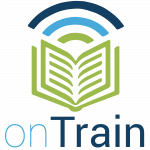
Project duration: 2018 – 2020 Online learning environments are widely used by training institutions but those tend to be used as content delivery, therefore a huge capability of those environments and teaching method is missed. Also, a lot of practitioners are engaged with training activities not being educators (tutors, facilitators, coach, mentors, team leaders, human resources departments…). The necessary background of pedagogies and techniques is missed and theoretical manuals are not the best way to make that kind of people acquire the necessary skills. They need some effective and practical way to learn. They have a lot of experience and expertise teaching face-to-face, but when having to do online training, they miss the digital skills and affordance of the technological capabilities. We do not aim to create a manual for trainers, as there are a lot of already existing ones. We want to create an online course, together with a student’s workbook to directly teach future online trainers. We will reduce the theories to a minimum while focus on exercises and practise so they will feel the online environment as a learner. The title of the project “online training: the treasure within” makes reference of our target activity, that is “training”, and the treasure makes reference to all the benefits that can be obtained from online learning: (1) learning the subject course, (2), new learning methods based on net-society (3) applied ICT competences, including soft-skills and transversal digital competences. Partners applying for [onTrain] project have already identified the needs and potentialities of an adequate online training in papers such as “Senior students in virtual spaces; the treasure within” (P.Escuder et al. in ICERI 2015 Seville), “Virtual online learning; the evolution and grow of Senior Citizens” (P.Escuder et al. INTED 2017 Valencia), In these researches we do not only show the capacities of online teaching environments that usually are missed, but also the competences, soft skills, attitudes and values that adult and senior learners acquire. The validation here becomes also crucial and we want to facilitate this process as stated in the research “Technology-enhanced transversal skills for lifelong learning: method, competences, validation” (A.Beltran, R.Esteller et Al.l. in ICERI 2016 Seville). P3-ULE has also demonstrated a need of the project as the new trainers lack the expertise necessary to use a virtual platform for teaching (focus groups research), currently, senior trainers, are the ones involved in this exchange of knowledge. Besides the need and solution identified and published in previous conferences, there is also a European need. It can be observed from current policies: Action 68 of the “Digital Economy & Society” with the title “Member states to mainstream eLearning in national policies”, saying “Today eLearning is not sufficiently present in Member States’ education”, naming the benefits and supporting the effective use of ICT for learning. The CEDEFOP survey “How do teachers, trainers and learners rate e-learning training?” states the need of a motivational environment, being this the main factor of success (p. 25) also states that the future of the e-learning is Collaborative (p.41) and embedded in the Lifelong learning and competence development process (p. 33). On the “Key competences for lifelong learning” recommendation (Recommendation 2006/962/EC) considers 7 competences that are needed for citizens. Those competences describe some skills and attitudes, which the [onTrain] project targets: learning individually or in groups, organise one’s own learning, initiative, communicative skills and the confident and critical use of information society technology. We aim to create a learners’ coursebook and an online course for trainers with low ICT skills and technological pedagogies so they can learn by themselves the application of technology enhanced education methods, techniques and tools, thus they acquire the necessary skills and competences to become successful online trainers (1st aim). We want to support them and facilitate the transferability of the skills and competences learnt to their own subject (2nd aim). Those skills include the use of technology for collaboration, creativity, problem solving, teamwork, etc. A tool will be made available (as online service), so they can use the lessons learnt in their own teaching activities (3rd aim) Main target of this project are the trainers and educators (tutors, facilitators, coach, mentors, team leaders, human resources departments…) that want to start offering their training using online platforms. This project has to be carried out transnationally because it is necessary to take into consideration different kind of institutions and cultures; virtual education is an activity without frontiers and should be designed avoiding local restrictions or characteristics that would make methods and services we propose too much specific. Facebook The project is financed by Erasmus+ KA2: 2018-1-ES01-KA204-050702
Mr. Winston

Project duration: 2018 – 2020 This project intends to use this approach to target VET professionals and learners education, as well as language schools, as English is one of the most important professional skills in Europe. VET organisations do not necessarily have important resources to train their English teachers or to acquire innovative tools. Also, learners in VET education do not necessarily have a lot of time to spend on reviewing their lessons and might not feel confident in studying on their own: an English tutor chatbot could help them be consistent in their studies. This is why we think it is useful to develop a ready-to-use mobile learning solution with supporting lessons for English language learning for VET and language school learners. It is important for this project to be carried out transnationally in order (a) develop a solution to build up an essential professional skill in Europe and (b) be adaptive to the different situation with regards to the variety of English proficiency in different European countries. According to the latest European Survey on Language Competencies, in 2012, English was a mandatory language in 14 countries or regions within countries of the EU. It is by far the most taught foreign language in nearly all European countries at all educational levels. The trends identified in this survey show an increase in the percentage of pupils learning English at all educational levels since 2004/05, and particularly at primary level. In 2009/10, on average, in lower secondary and general upper secondary education, the percentage of pupils learning English was higher than 90 %. In upper secondary pre-vocational and vocational education, it reached 74.9 %. Furthermore, it is a key skill for employability: the European Commission Study on Foreign Language Proficiency and Employability (2015) revealed that over four in five employers interviewed and three quarters of advertised online vacancies stated that English was the most useful language for the jobs discussed in all sectors and in almost all non- English speaking countries. Therefore, it is important that learners have an engaging English learning experience that will not only help develop one of the most important professional skills in Europe, but also help them develop their language studying skills so they can learn additional languages in the future. This is why the objective of this project is to create together an English tutor chatbot to support the students in their learning process and the teachers in their teaching activity. Website | Facebook | LiveBinder The project is financed by Erasmus+ KA2: 2018-1-BE01-KA202-038594
App4Skills
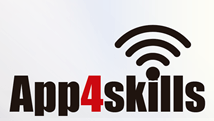
Project duration: 2017 – 2019 Adults in Europe have difficulties in the three areas identified as core competences by the European Commission: literacy, mathematical competence and digital competence. For example, in Europe, one in five 15 year-olds and one in five 16-65 year-olds have poor reading skills; and around 55 million adults between 15 and 65 years of age have literacy difficulties (ELINET, 2015). Regarding mathematical competences, the 2013 OECD Survey on Adult Competencies (PIAAC) found that 24% of European adults scored at (or below) level one in a scale of five. The data are not better if we focus on digital skills. According to the data of the Digital Indicators Table, 80 million Europeans have never used the Internet, and according to the most recent data published by the European Commission on the Digital Economy and Society Index (2017), 44% of Europeans do not have basic digital skills. The need to promote innovation in the development of adult education, adapting the teaching-learning process to the changes in society, mainly through the use of active and cooperative methodologies, diversified evaluation instruments and integrated Information and Communications. Technologies (ICT), brings us to propose this project, which will design and develop a web application. Website | Facebook The project is financed by Erasmus+ KA2: 2017-1-ES01-KA204-038478
Language Voices
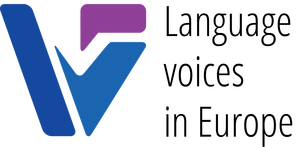
Project duration: 2017 – 2019 As the growing number of migrants in Europe struggle with limited financial resources, this project aims to improve and facilitate their access to second language studies through participation in Language Voices language cafés, which are informal meetings based on volunteering but also systematically organised. The migrants gain access to social, informal environments of the resident country while integrating into a community of learners and tutors, which is often a key success factor in establishing a quality life in a new country. The project will provide: 1) a preparatory training and handbook so that the multilingual Language Voices concept can easily and successfully be replicated throughout the EU or anywhere else in the world; 2) A comprehensive material bank with language learning and cultural material and resources and a possibility for online communication and language exchange; 3) A mobile application to find language exchange events available in the partner countries; 4) A Language Voices association registered in Finland to carry on the activities. The project objectives are: 1) to mitigate some initial barriers to language studies (regarding opportunity, access and cost); 2) to facilitate the proliferation of easily accessible, informal, low-cost but well-structured language training opportunities and material; 3) to provide all-encompassing multicultural, multilingual environment and meeting places in cooperation with local small businesses. Website | Mobile App | LiveBinder | Twitter | Facebook The project is financed by Erasmus+ KA2: 2017-1-FI01-KA204-034714
Opening Doors Giving Opportunity

Project duration: 2017 – 2019 Our project is focused on reducing dropout rates, and the objective is to offer a second chance to the disadvantaged students in particular, who have dropped out of school for various reasons, allowing their return to the education system to complete their studies and improve conditions for finding a job. We develop activities via peer learning and collaborative work that answer to improving the acquisition and integration of basic competences into the curriculum, development of new approaches to strengthen the educators’ training, digital integration of languages in the learning, promotion of unified qualifications on a European level and innovative projects directed to reducing the differences in the results of learning that concern the students in disadvantaged environments. The results developed in the project are: 1) Management manuals; 2) A study of premature abandonment within the school system; 3) Institutional programs that are applied in every participant country; 4) Examples of good practices: a) Prevention of school dropout, b) The access to other levels of the educational system, c) Promotion of active citizenship; 5) Reduction and improvement of the programme of school failure in our institutions, a) Formal and non-formal learning; 6) Collaborating with city halls, institutes, teacher training colleges and other organisations in the participant regions; 7) Examples of good practices related to innovative experiences in education; 8) Strategies of intervention for disadvantaged groups. Website | Facebook | Twitter The project is financed by Erasmus+ KA2: 2017-1-ES01-KA204-038438
Youth Online

Project duration: 2017 – 2019 Youth Online project originates from the necessity of adaption to continuous technological and educational changes in the world and also for fighting against widespread educational problems of schools. The aim of this project is to draw attention to the drop out for the students between 15-18 and to set examples of preventive measures. The purpose of the project is to determine the current situation of the schools for this problem by situations, needs and risk analysis regarding the students and their reasons for dropping out and poor attendance, and to develop prevention measures for the students in risk group in the form of an online tool; an application which the students can use to both develop their skills and make career plans. The project aims to develop a conscious and resilient follow-up strategy by raising awareness about ESL with analyses and creating an online tool application to appeal to the interests of students. We believe that ESL is closely connected to the deficiency of skills and competences among youth and if we support their social improvements they can be more motivated about their future and about finding a job. We aim to find solutions for the following: What are the reasons for drop out and poor attendance? Which students in the school are under risk? How can we make our schools a better place for the students in this technological era? How can we help them improve? How can we create an environment to help them discover their abilities and socialise? Facebook | Webapp The project is financed by Erasmus+ KA2: 2017-1-TR01-KA201-046747
DIALoguE
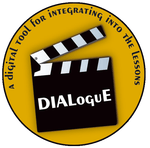
Project duration: 2016 – 2018 DIALoguE – A digital tool for integrating into lessons DIALoguE project will develop a new tool that can be used in all subjects at school. In the frames of the project, the tool will be developed for the history lessons only. This project will attract students to the history classes by leveraging technology, provide permanent learning for students, help students to develop an empathetic approach to historical events, facilitate the professional development of teachers, improve students’ intercultural communication and peer relationships, and increase students’ ability to think creatively. We will design a digital tool and a teaching method that will integrate cinema films and short films shot by students into the history curricula. The partnership within “DIALoguE” therefore intends to: produce a new tool for education technologies with international cooperation generate an innovative approach in the education establish permanent learning in lessons raise the awareness of teachers in the subject of outstanding methods in history lessons. Facebook | LiveBinder The project is financed by Erasmus+ 2016-1-TR01-KA201-034762
Moving Languages

Moving Languages – Mobile Virtual Learning for Languages Project duration: 2016-2018 Language learning is one of the key priorities of successful integration, and applications for smart phones or tablets e.g. are an effective educational source for those migrant groups, as a large percent of them are digitally literate and are looking for new learning opportunities in their new countries online. The project provides a gamified language-learning solution – available in English, Spanish, Italian, German, Swedish and Finnish and three languages most widely spoken by the immigrants in the partner countries – that shall help refugees/immigrants learn the local language and familiarize themselves with new concepts in their new countries. These applications will also be useful for any other immigrants who have already been living and working in their new home country for some time. The Moving Languages content of the mobile applications covers the topics that are essential during the first steps of living in the new country and contains 2000-2500 vocabulary items illustrated for easy concept recognition. Free download available from 2017 on at major app stores. Website | Facebook | Twitter | Instagram | LiveBinder The project is financed by Erasmus+ 2016-1-FI01-KA204-022678
Mobile Tech

Project duration: 2015 – 2017 Technological Empowerment for VET trainers. An Open Educational Resource (OER) to train VET trainers in the design and use of m-learning methodologies M-learning is the addition of learning (in any modality), mobile devices (Mobile, tablets, etc.) and wireless network (Pacheco and Robles, 2006). This learning modality has some unique attributes that can enhance education beyond the ‘anywhere, anytime’ learning (Shuler, 2009). Moreover, it allows individual or collaborative learning, trains problem solving skills, allows access to information in the moment of need, etc. Nevertheless most of VET trainers are not aware about the potential of mobile devices as a tool for learning or do not have the necessary competences/knowledge to use mobile devices for learning. The aim of MOBILE-TECH project is to make mobile learning a reality in VET centers by supporting teachers, trainers, educational staff and youth workers in acquiring or improving the use of mobile learning and related digital competences in an Open Collaborative Learning Platform. To achieve these objectives, we will develop three open resources: – A Trainers´ guide for mobile resources to be used in the classroom. The guide will include National and European good practices about m-learning; – A Trainers´ course: How to develop new training resources and teach mobile learning; – An Open Collaborative Learning Platform for trainers´ learning multimedia resources, including a section to enable interaction among users. With MOBILE-TECH project we will contribute to the adaptation and empowerment of the VET trainers to the demands and needs of their students by providing them with the necessary competences in mobile learning. Facebook | Twitter | YouTube | LiveBinder Project funded by the Erasmus+ – Cooperation for innovation and the exchange of good practices: 2015-1-ES01-KA202-015903
